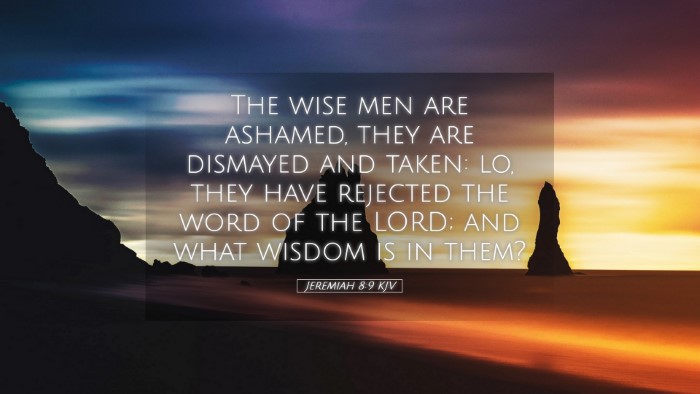Commentary on Jeremiah 8:9
Verse: “The wise men are ashamed, they are dismayed and taken. Lo, they have rejected the word of the LORD; and what wisdom is in them?” (Jeremiah 8:9, KJV)
Introduction
The verse from Jeremiah 8:9 presents a profound indictment of the wisdom of the world in contrast to the divine wisdom found in the Word of God. It underscores the folly of relying on human understanding when it stands in opposition to God's revelations. This commentary amalgamates insights from various public domain sources, aiming to provide depth and clarity for its theological implications.
Contextual Background
Before delving into the specifics of the verse, it's essential to consider the broader context of the Book of Jeremiah. Jeremiah, known as the 'weeping prophet', prophesied during a tumultuous time leading up to the Babylonian exile. His messages often emphasized the consequences of rejecting God's commandments and the futility of trusting in human wisdom.
Historical Context
The people of Judah were facing impending judgment due to their persistent idolatry and disobedience. In this historical backdrop, the wise men of Israel, who were supposed to guide the nation, failed to provide true counsel, leaning instead on their own understanding.
The Wise Men’s Shame
This verse begins with the phrase "The wise men are ashamed," which signals a significant reversal of expectations. In ancient Israel, wisdom was equated with understanding and the ability to foresee and advise on matters effectively.
Insights from Matthew Henry
Matthew Henry notes that the humiliation of the wise men stems from their inability to grasp the dire situation facing Judah. Their knowledge, which was rooted in worldly wisdom, fell short in addressing the urgent spiritual crisis of the nation.
Albert Barnes's Perspective
Albert Barnes emphasizes that the 'wise men' represents the prophets, priests, and sages who were supposed to lead the people back to God. Their shame comes from their rejection of divine counsel, illustrating that human wisdom devoid of divine truth is ultimately powerless.
Adam Clarke's Interpretation
According to Adam Clarke, the wise men’s dismay signifies their realization of their limitations in understanding the unfolding prophetic judgments. They acknowledge their reliance on fallible human reasoning rather than submitting to God’s immutable word.
The Nature of Human Wisdom
Jeremiah 8:9 also poses a critical question regarding the nature of human wisdom when it stands in opposition to God’s truth. The verse explicitly states: “Lo, they have rejected the word of the LORD; and what wisdom is in them?”
Rejection of the Divine Word
There is a clear correlation between the rejection of the Word of God and the emptiness of human wisdom. When the wise men turned away from divine guidance, they entered a state of confusion and error.
Impact of Rejection
Such rejection leads to disillusionment. As Henry articulates, this dismay reflects a broader consequence experienced by all who neglect the Scriptures in favor of ephemeral worldly knowledge.
Theological Implications
This verse brings forth significant theological considerations that resonate within the Christian faith today:
- The Primacy of Scripture: The assertion that true wisdom is found in God’s Word emphasizes the need for individuals and congregations to prioritize biblical teachings over secular philosophies.
- Humility in Learning: The acknowledgment of human limitation in understanding is a necessary posture for both theological and pastoral reflection. A humble reliance on God’s revelation is paramount.
- Warnings Against Apostasy: This passage serves as a warning to the contemporary church about the dangers of neglecting God’s instruction in pursuit of cultural relevance or personal gain.
Conclusion
In Jeremiah 8:9, we find a powerful reminder of the futility of human wisdom when detached from divine guidance. The insights drawn from Matthew Henry, Albert Barnes, and Adam Clarke invite deep reflection on the necessity of embracing God’s Word as the ultimate source of wisdom. For pastors, theologians, and scholars, this verse calls for a renewed commitment to Scripture, recognizing that true understanding and guidance come only through the acknowledgment of God’s sovereignty and the submission to His will.


